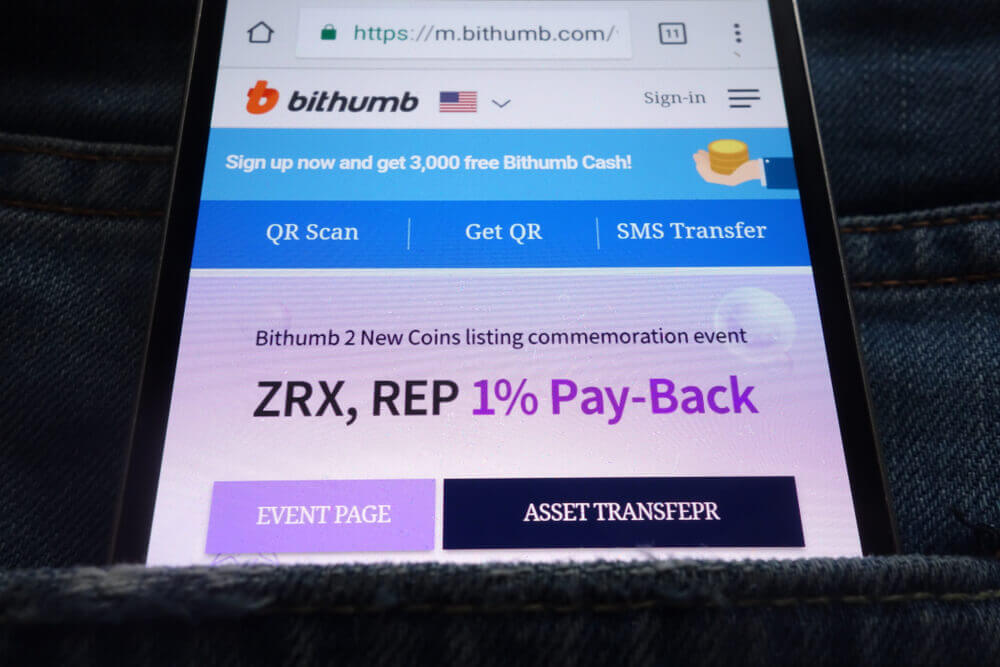
Bithumb Will Block Crypto Withdrawals To Unverified Wallets
Starting January 27, South Korean cryptocurrency exchange Bithumb will not allow users to withdraw their crypto assets to unverified private wallets.
On January 24, Bithumb announced it would become the second of its four largest exchanges to ban withdrawals to unverified wallets. Coinone enacted a similar policy late last month, and other major exchanges are Upbit and Korbit.
The new policy states that users can only register their private wallets. The user must undergo an additional series of “know your customer” authentications to perform the registration process.
However, customers are free to withdraw funds from any centralized domestic exchanges and centralized foreign exchanges with strict KYC processes, such as Kraken, Bitstamp, Blockchain.com, Bybit, and Binance.US.
The exchange is under pressure from its partner bank, Nonghyup Bank. The bank has pushed the exchange to change its policies to comply with FATF travel rules. The travel rule lets financial institutions know the identities of senders and recipients of cross-border funds.
Every South Korean cryptocurrency exchange offering Korean Won (KRW) trading pairs must have a domestic partner bank. Additionally, the partner bank should issue real-name bank accounts to its users. Partner banks can significantly impact the exchange’s policies, as Nonghyup did with Bithumb and Coinone.
So far, exchanges Upbit and Korbit have not issued any policy changes related to personal crypto wallets. When the South Korean government deems such policies necessary for all exchanges, the government will require exchanges to enact these policies by March 25.
According to statistics, Upbit handles about 76% of the domestic transaction volume, while Bithumb, which ranks second, handles about 13%.
Non-compliance with travel rules may lead to increased Anti-Money Laundering and Countering the Financing of Terrorism (AML/CTF) surveillance.

Bitcoin Price Slump Tests The Resilience Of Crypto Miners
Bitcoin miners face a crucial test after the coin plunged 50% from its all-time high.
Lots of mining operations made decent profits during last year’s Bitcoin rally. However, the recent decline may punish those with less efficient operations.
Mining is an expensive industry fraught with regulatory and environmental issues, and falling prices complicate the situation.
The recent crypto market issue might cause the elimination of miners who are less efficient or sign more expensive power contracts.
The sell-off comes at a fragile time for the industry. Russia’s central bank has proposed a ban on miners. It means that miners will need to relocate around 15% of the bitcoin mining capacity. Meanwhile, the industry can bounce back as similar things happen in China After the blockade. There even might be more casualties this time.
CeanSpark, Marathon Digital Holdings Inc., Bitfarms Ltd., and Hut 8 Mining Corp. are all down more than 30% this year. However, companies that use excess cash (from bitcoin’s rally, public offerings, or newly issued debt) to buy more efficient mining rigs may fare better.
With bitcoin trading near $36,700, miners with older machines — about 23 percent of the computers powering the network — are dangerously close to a tipping point where they may not be able to earn enough for electricity, let alone labor and other Fees, research from digital asset fintech firm BitOoda’s presentation.
Meanwhile, those with the latest mining servers are threatened with shutdowns only when Bitcoin falls to $20,000.

Biden Administration Plans Issue Crypto Executive Order
The Biden administration is preparing to issue an executive order as early as next month. He will outline the government’s comprehensive strategy for cryptocurrencies and ask federal agencies to identify its risks and opportunities.
The directive will give the White House a central role in overseeing policy development and regulating digital assets.
For years, federal agencies have researched or provided regulatory guidance around the digital asset space.
The Office of the Comptroller of the Currency (OCC), the Securities and Exchange Commission, and the Commodity Futures Trading Commission have issued guidance letters, informal statements, and public rulemaking efforts to guide how different aspects of the crypto industry should comply with federal law. But these efforts are not coordinated in a single document or by an agency.
Senior Biden administration officials have met multiple times to discuss the directive presented to the president in the coming weeks.

What Has Happened Between Cardano-Based Sundaeswap And Cardstarter Projects?
The ongoing drama between two projects based on the Cardano (ADA) blockchain escalated across multiple social media platforms on Monday, much to the ADA community’s dismay.
The problems started in April when CardStarter announced launching its decentralized exchange or DEX. Shortly after that, its founders incentivized investors to provide liquidity to projects on Uniswap in exchange for native CSWAP tokens. The platform’s developers later struck a deal with a third-party DEX called SundaeSwap, which they dubbed a “merger” last June.
According to the agreement, CardStarter will no longer develop its promised DEX but will provide liquidity to the existing SundaeSwap DEX.
Later, investors were promised massive interests at a YouTube ask-me-anything session for CSWAP holders in the SundaeSwap DEX.
However, it was revealed last week that these purported benefits were only converted from CSWAP to CardStarter’s native CARDS token ($3.14) at a 400:1 conversion rate. Holders of the $15 million worth of liquidity (at the time of disclosure) locked on the platform seem to feel this is a slap in the face, with no meaningful reward for their efforts. Allegations of rug pulling quickly emerged.
Both SundaeSwap and CardStarter took to social media to accuse each other of investor influence — much to the dismay of ADA enthusiasts and Cardano founder Charles Hoskinson.
According to a statement from SundaeSwap cited by Hoskinson, the June deal was purely a marketing and partnership agreement. However, the SundaeSwap team admits to using misleading terminology multiple times when communicating with users.
To make matters worse, the newly launched SundaeSwap DEX suffered from many user reports of failed transactions.
-
Support
-
Platform
-
Spread
-
Trading Instrument




